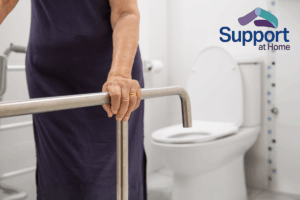The centenary of the discovery of insulin is a timely reminder that diabetes has been on our radar as a serious health concern for some time, especially when it comes to aged care. According to the Australian Bureau of Statistics, around 1 in 6 people over the age of 65 in Australia report having diabetes, with the highest prevalence being in those over 85, and this number is rising.
Restrictions and isolation due to the pandemic has meant that keeping up with routine care needs has been a challenge for older Australians. And when it comes to diabetes care, making the best daily lifestyle choices is critical to keeping life impacting complications at bay whilst ageing in place.
But why is diabetes such a concern for older Australians? When someone has diabetes, their body can’t maintain healthy levels of a type of sugar, called glucose, which we get from food we eat. Glucose levels are managed in the body by a hormone called Insulin which helps us turn glucose into energy. When the body’s ability to produce insulin is impacted, as is the case with diabetes, glucose levels in the blood cannot be regulated, leading to serious health complications such as:
⦁ Heart attacks and strokes – diabetics have a four times higher risk of these events.
⦁ Blindness – diabetes is the leading cause of preventable blindness in Australia.
⦁ Kidney failure – three times more common in people with diabetes.
⦁ Amputations – 15 times more common in people with diabetes.
⦁ Poor mental health – more than 30 percent of people with diabetes experience depression, anxiety, and distress.
All of these complications could significantly limit the independence of someone ageing in place and increase the need for in home care or aged care support.
There are two main types of diabetes:
Type 1 diabetes is an autoimmune condition that affects the production of insulin in the body. Unfortunately, we do not know what causes Type 1 diabetes, and because it is an autoimmune reaction, it cannot be prevented by modifiable lifestyle factors. Instead, Type 1 diabetes is managed with insulin injections several times a day or the use of an insulin pump.
Type 2 diabetes is by far the more common type, representing 85-90% of all cases of diabetes.
With Type 2 diabetes, the body becomes resistant to the normal effects of insulin and over time loses the capacity to produce enough insulin, giving rise to the increase in blood glucose levels. This means it can be occurring silently at first, and progress in severity and requiring oral medications and/or insulin injections in addition to lifestyle changes.
It is estimated that 2 million Australians are at high risk of developing Type 2 diabetes and yet many people don’t know they are at risk or what signs to look for. Diabetes Australia has a great online risk calculator tool to help assess your risk. This fantastic tool will tell you if it is time to start putting into place the strategies and activities needed to delay and even prevent diabetes. Research has shown that Type 2 diabetes can be prevented or delayed in up to 58% of cases by maintaining a healthy weight, being physically active and following a healthy eating plan.
Regardless of the type of diabetes you or your loved one has, paying attention to the food you eat, how you move, your mental health and your medical condition each day will alert you to the adjustments needed to live well with diabetes.
Weight management and healthy food choices.
One of the most significant impacts on diabetes comes from weight management. Managing and maintaining a healthy weight both lowers the risk of diabetes and will improve the outcomes for those managing diabetes. Fruits, vegetables, whole grains, and lean meat are always best in moderation as opposed to an intake of fatty, sugary foods. Check out our Life Enrichment Guide for some nutritious and delicious recipes. The help of an in home care team can make this even easier, as our Home Care Assistance in home Care Workers are trained in nutrition and have the right skills to monitor food and fluid intake to ensure appropriate nourishment, blood sugar levels and hydration.
Regular physical activity.
Exercise is a great way to help to lower blood sugar levels and increase the way the body responds to insulin. It is also a great mood booster, and the right movement plan can be found for anyone, regardless of age, stage, or physical capacity. A daily walk, a gentle dance in the lounge room, or even a set of chair based exercises can give your body what it needs to manage insulin. The key is doing it daily, and the support of in home care can make sure this routine is in place, is manageable and more fun too.
Emotional and mental wellbeing.
Physical activity will help to ward off the increased risk of the mental health impacts of diabetes. In addition to exercise, mindfulness can also be a great way to manage stress and elevate mood. Take time to stop, breathe deeply and be mindful of what’s around you. Listen out for birds singing, listen to a lovely piece of music, smell a flower, fresh air, or a piece of ripe fruit, and help get into the right frame of mind to persevere with diabetes management and keep up the all-important lifestyle modifications. The easing of pandemic related restrictions has brought us more opportunities to socialise for our mental wellbeing, as well as take part in activities that can boost our physical health. Whilst these are key to successfully managing diabetes, we must also remember that if someone with diabetes was to be diagnosed with Covid-19, they are far more likely to experience a more severe version of the disease than someone who does not have diabetes. Enjoying an active and healthy lifestyle to manage diabetes must still be done safely to avoid unnecessary complications.
Access to medical support.
Regular checks of general wellbeing indicators like blood pressure and cholesterol levels are also important in managing diabetes. When ageing in place, in home care support can be a great triage here, as well as support visits to the doctor to keep things in check.
For people ageing in place, in home care is a great way to ensure the right support and management is maintained for those with diabetes. Talk to Home Care Assistance if you or your loved one could benefit from some support to create the right lifestyle to prevent or live well with diabetes.
Join Our Newsletter
Our Latest News
As a leading age care provider, Home Care Assistance offers tailored in-home care services for older Australians, enabling them to live happier and healthier lives in the comfort of their own homes.
We offer private and government subsidised Care Packages and have office locations that are a registered NDIS provider. Our Care Workers undergo extensive training in order to deliver unmatched in-home aged care services where people can continue ageing in place. We are proud ambassadors of the My Aged Care government funded aged care program, enabling Australians to successfully navigate the process and gain approval for in-home care support packages. Home Care Assistance offers hourly care, specialised care, Alzheimer’s and Dementia care, hospital to home care, and 24 hour in home care.













